Josh Rychlinski — Assignment for October 23, 2013
Google, Search, and Antitrust
You only need read the links that say Read in front of them. Some of the other links may be useful.
1. Introduction
a. Although the intersection of Cyberlaw and Antitrust may seem like a rarity, companies like Google, Microsoft, and Apple have all litigated in this area regarding their browsers, search results, advertising, pricing, and other Cyberlaw related aspects of their business. In particular, Google, the first stop of many users on the Internet, has received much antitrust attention the last several years.
b. US Antitrust law
i. Section 1 of the Sherman Act bans collusion between producers. This section of the statute targets trusts, cartels, and other such agreements, which were common at the time the Sherman Act was originally enacted.
ii. Section 2 of the Sherman Act bans the abuse of a dominating position or monopolization. This section is much more relevant for Google and other tech companies. Microsoft was prosecuted under this section starting in the 1990s, where Microsoft bundled Internet Explorer with Windows in order to choke Netscape, a rival browser, out of the market.
iii. Section 5 of the FTC Act also prohibits "unfair methods of competition." This is a somewhat loose standard that ends up being litigated a lot, but allows the FTC to investigate and regulate a range of different behaviors. The remedy for a Section 5 violation is a cease and desist order, which can then be reviewed in district courts.
iv. The Department of Justice and the FTC are responsible for enforcing both of these acts.
v. There are two major doctrines in Antitrust law: rule of reason and per se. Some conduct, such as two competitors agreeing to fix their prices, is and always has been, per se illegal in an antitrust context. Other conduct, such as patent licensing schemes and other restrictions are now evaluated under the more lenient rule of reason standard.
c. EU Antitrust law
i. Article 101 of the Treaty on the Functioning of the European Union is very similar to Section 1 of the Sherman Act, and also bans agreements between competitors which restrict competition, like trusts and cartels.
ii. Article 102 of the Treaty is very similar to Section 2 of the Sherman Act, and prohibits abusing a dominant position in a market.
iii. The EU Antitrust Commission has the power to level fines can be up to 10% of annual revenue. Microsoft and Intel have both been hit with fines over $1 billion USD.
d. Read Antitrust Law Protects Consumers, Not Competitors
i. Do you find the argument that consumer surveys should play a role in antitrust determinations at all persuasive?
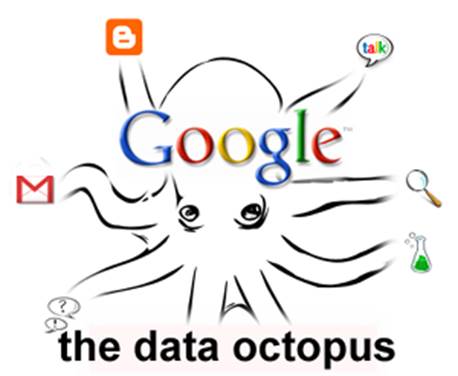
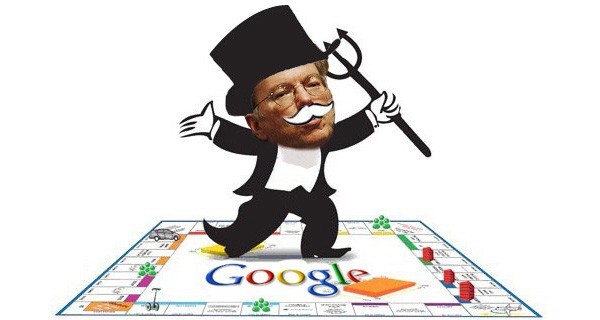
2. Is Google the 21st century Standard Oil?
a. Look at this screenshot. Every single link on this page redirects to a Google product or service.
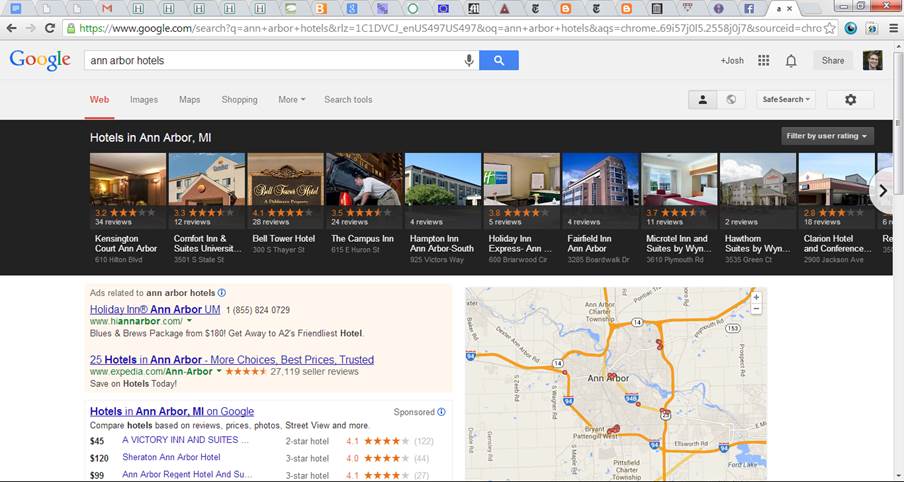
i. Please do this with some of your own searches and note how much of the results you see are links back to Google products or Google services.
1. In the 1990s and early 2000s, Microsoft argued that Internet Explorer was not a separate product from Windows. Therefore, Microsoft was not illegally bundling anything together, it was simply one product the consumer was purchasing. Do you as a consumer have a same view with Google (the search engine) and something like Google Maps or Google Places?
b. Read Google, Its Competitiors, and Competition Law
c. Google and the EU Investigation
i. The core issue of the EU investigation is Google favoring its own products in search results. Additionally, Google scrapes public data from websites such as Yelp and integrates it into Google’s own products to compete with the very same websites which gathered the information in the first place.
Timeline of the Investigation
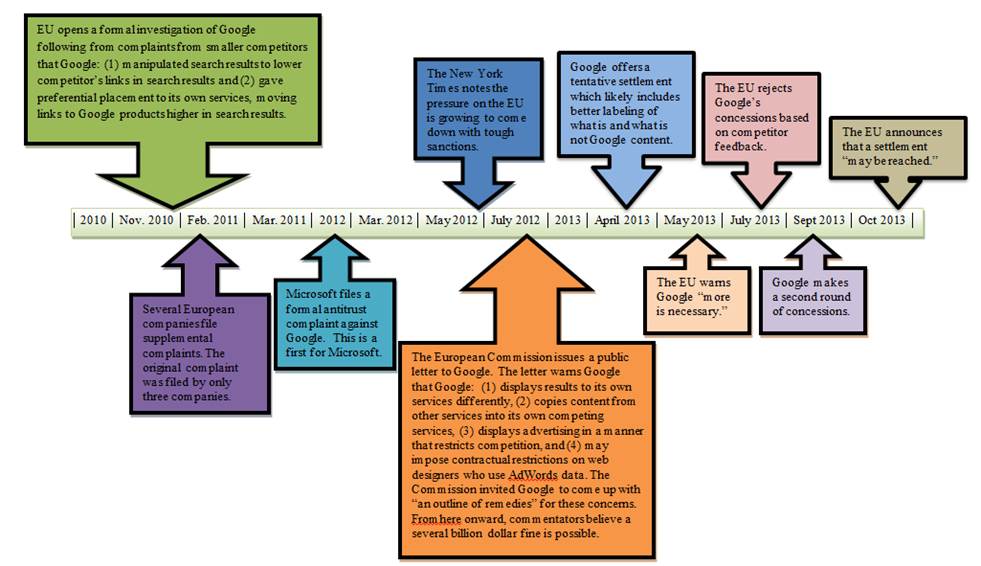

d. Google and DoJ
i. The FTC investigated Google for 19 months. The FTC found no search changes were necessary, but did find against Google in Google’s restrictive use of AdWords, as well as patent licensing (see Part 4). Read an archived copy of the Press Release from the FTC announcing the decree. Ignore the patent aspects until Part 4.
ii. Previously, Google had previously restricted the ways the data from AdWords (clicks, etc.) could be viewed. Now, AdWords users can integrate the data into other programs which aggregate advertising information from different sources (i.e. AdWords, Banner Ads, Youtube, etc).
1. Does this change actually mean anything to you as a consumer of Google’s services?
2. Are you as a consumer at all concerned that the FTC and the EU antitrust investigations came out differently? Should the FTC have a more transparent process with its decisions, similar to the EU’s somewhat public back and forth?
e. Brazil has begun to investigate Google for essentially the same reason the EU did.
f. Obviously, by the time these investigations even start, let alone finish, the landscape has changed drastically. Is Antitrust the right tool for regulating companies whose primary business occurs on the Internet? Should the FTC be wary of Facebook abusing its market dominance? Should it have been wary of MySpace? Friendster?
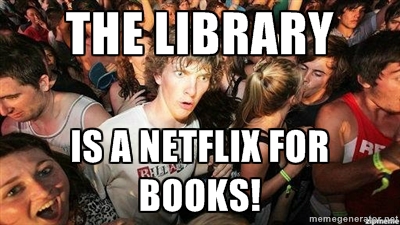
3. Antirust and eBooks
a. Google Books
i. This controversy is an outgrowth of the copyright litigation over book digitizing by Google, much of the antitrust concerns revolved around Google’s possible monopoly on orphaned works. The authors guild and Google entered into a proposed settlement which gave Google the rights to any orphaned works.
ii. Read one of Framing the Issue and Mark Lemley on Antitrust and Google Books Search.
1. Both of these scholars (as well as several others) don’t seem to find any issue with the proposed settlement. However, the DOJ (and a reviewing court) disagreed. The court was unclear as to the role antitrust played in its decision. Who do you think was right?
b. Apple, Amazon, and eBooks
i. Read the TechCrunch Summary of the case, as well as the New York Times Key Excerpts. Also glance at this Amicus Brief advocating for Apple (in comic book form) which offers a good summary of facts the case. There’s a lot of economic jargon and Antitrust case law thrown in but the gist should be clear. If you want to read the actual 172 page opinion, here it is.
ii. Which narrative do you subscribe to? Big Bad Apple and the Big Bad Book publishers conspired to raise the price of eBooks the market had already set or Gentile Apple and Book publishers were correcting the artificially low price of eBooks that Amazon was able to initially set with its market dominance. Apple has appealed the ruling.
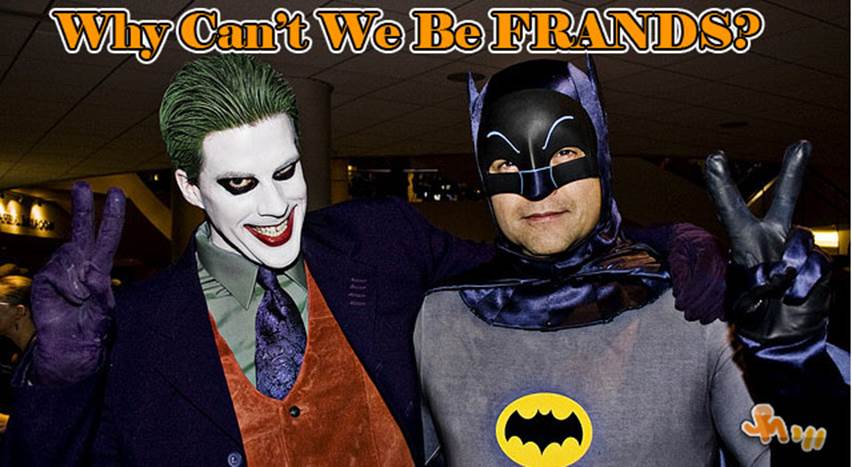
4. FRANDS, SSOs, and SEPs: A Brief Introduction to a Very Obscure Area of Patent Law
a. FRAND, standing for Fair Reasonable And Non —Discriminatory, is a special term used in patent licensing. Often complex technologies, such as Blu —Ray or Wi —Fi, involve technology developed (and patented by) many different companies, often competitors. In order to get an industry to settle on a standard, entities called Standard Setting Organizations (SSOs) meet and decide what aspects of technology should be included in a standard such as Wi —Fi. If that technology is covered by a patent, the patent is then termed a Standard Essential Patent (SEP). In order to be included in a standard, the company that owns an SEP must make a FRAND commitment. Essentially, the company agrees to give everyone, even competitors, the same FRAND license. The company maintains the right to sue alleged infringers for damages, but an injunction, a traditional patent remedy, might no longer available.
i. Based on the reading thus far, do you see a problem with SSOs? Perhaps look again at Section 1 of the Sherman Act.
b. Judges and FRAND
i. Judge Richard Posner, sitting in District Court, had the following to say about FRAND and SEPs in a Motorola v. Apple case:
"The proper method of computing a FRAND royalty starts with what the cost to the licensee would have been of obtaining, just before the patented invention was declared essential to compliance with the industry standard, a license for the function performed by the patent. That cost would be a measure of the value of the patent qua patent. But once a patent becomes essential to a standard, the patentee’s bargaining power surges because a prospective licensee has no alternative to licensing the patent; he is at the patentee’s mercy. The purpose of the FRAND requirements, the validity of which Motorola doesn’t question, is to confine the patentee’s royalty demand to the value conferred by the patent itself as distinct from the additional value —the hold —up value —conferred by the patent’s being designated as standard —essential . . . Motorola has provided no evidence for calculating a reasonable royalty that would be consistent with this point.
So damages are out for both parties. But a patentee can also seek injunctive relief for infringement, and both parties seek such relief, as I have already noted with respect to Apple.
To begin with Motorola’ injunctive claim, I don’ see how, given FRAND, I would be justified in enjoining Apple from infringing the ′898 unless Apple refuses to pay a royalty that meets the FRAND requirement. By committing to license its patents on FRAND terms, Motorola committed to license the ′898 to anyone willing to pay a FRAND royalty and thus implicitly acknowledged that a royalty is adequate compensation for a license to use that patent. How could it do otherwise? How could it be permitted to enjoin Apple from using an invention that it contends Apple must use if it wants to make a cell phone with UMTS telecommunications capability—without which it would not be a cell phone."
ii. Read So That’s What FRAND Means? This article is analysis of a decision that tried to construct a " factors" test for FRAND.
c. Re-read the patent aspects of the Press Release from the FTC announcing the Google Consent Decree.
d. Skim the Google Consent Decree.
i. I realize the patent experience in the class is scattered, but do you think a FRAND commitment should act as a negation on the right to an injunction? If someone is infringing my patent, should I not be able to pursue various statute based remedies against them because of a contractual commitment?
5. With Google Search and other projects like Google Books and Google Scholar, by virtue of its market share Google could essentially come to control access to large swaths of the human race’s published content. Is this something you personally are concerned about? Is this something we as a society should be concerned about?
Return to the syllabus.